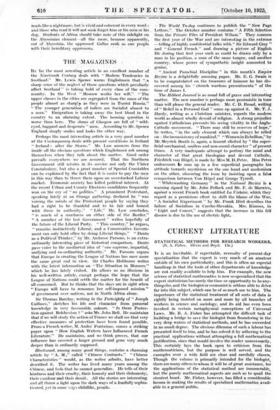SPORT AND BORDER WAR
Havash ! Frontier Adventures in Kenya. By Brevet Major W. Lloyd-Jones. (Arrowsmith. 15s.)
Hunting Memories of Many Lands. By Sir T. H. Grattan Esmonde. (Unwire. 7s. 6d.) Tins is a more than usually attractive group of books--one of them being memorable. But what stands out from all three is the way in which hunting passes easily into a training for war. There is, indeed, little suggestion of war in Sir Thomas Esmonde's genial and picturesque pages. He has hunted (and fished) in many lands, but more for the sake of the adventure than of the bag : he has sandwiched between chunks of par- liamentary existence good slices of the frontiersman's life. After reading him one asks why anybody should go and shoot in the Himalayas when Canada is open, but the answer
which Major Burrard would give is that big game shooting on the Indian frontier is the natural pastime of the British subaltern. The greater the difficulty, the greater the sport :
to him, a perfect expedition is one in which, after three weeks stalking, at altitudes in or .about 15,000 feet, you
get one shot, with a shikari holding your legs lest you fall over a precipice, and do not miss the mountain sheep or goat which a week's scrutiny, through glasses, has shown to have the correct length of horn. This is quite literally sport in excelsis !
Major Lloyd-Jones probably was a frontiersman because he was a sportsman : but he exchanged to African Service from Indian in order to see things happening ; and all the shooting he did in East Africa was while he was on active service.
Having the gift of narrative he revives his sport for us : but the special interest of his story lies in his relations with the company of the King's African Rifles which fell to his com- mand. These were Abyssinians ; and it is not easy to recall another book by an Englishman which speaks kindly of Abyssinians ; but Major Lloyd-Jones had good reason to do so. He was in action with them first against poisoned arrows —and excellently he tells this episode. But the poignant
chapters are those which describe how he, with twenty of his " Hayashi " to stiffen a half-company of Wakamba, was sent up to Lake Rudolph to check the incursions of Abyssinian outlaws. Here his men had to attack their own fellow- countrymen—marauding brigands armed with European weapons ; and in storming a stockade his own military career was ended. But for the amazing feat of arms performed by three of his Abyssinians, he would have certainly become a mutilated corpse. The story of his trek back, 400 miles in a stretcher, with perils on the road from lions, from charging
rhinoceros, and from hyenas, is told with amazing power : and, writing long years after it all happened, Major Lloyd- Jones lets the world know something of what a wounded man may suffer when no appliances are there to help. The tl ing
reads like a nightmare, but is vivid and coherent in every word : and those who read it-will not soon forget him or his men or his dog. Students of Africa should take note of this sidelight on the Abyssinian element—all the more, because apparently, out of Abyssinia, the oppressed. Gallas rank as one people with their hereditary oppresSors.



























































 Previous page
Previous page